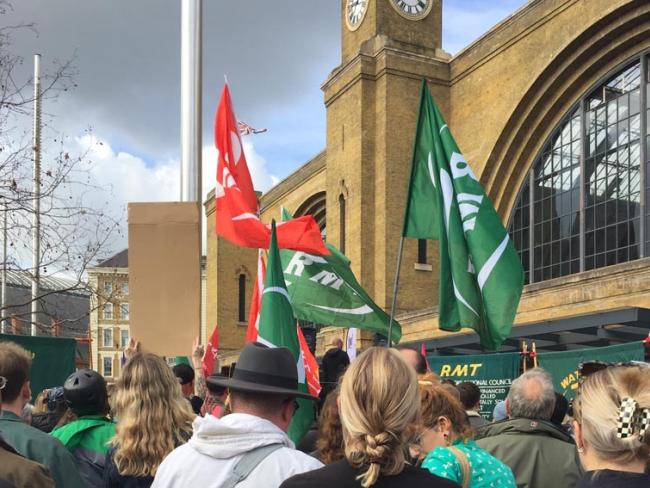23 October 2022

RMT flags and banners dominated at the Enough is Enough rally, King’s Cross, 1 October. Photo Workers.
The rail disputes are now nearly six months old, and railway workers and their unions – led by RMT – are now resigned to a long-drawn-out campaign as they fight for the future of their jobs and their industry, and endeavour to force employers to maintain the buying power of their wages. Many have had no pay increase for years.
The rail unions are displaying great maturity in their strategy, recognising that all-out strikes would not be wise, and instead are keeping up a steady campaign of disruption through one-day strikes that keep the pot boiling. Called at a frequency that minimises the financial hit borne by the striking workers, this also minimises the inevitable fall off in passenger numbers.
While the private employers wring their hands and say it is all the government’s fault for not allowing them to negotiate with the unions, the suspicion must be that it is they who are calling the shots and the government that is doing their bidding. As recent events show, government is there to do serve capitalists, not to tell them what to do.
Sabre-rattling
A great deal of sabre-rattling from various government ministers about curbing the rail strikes has –- as yet – come to nothing. Before Prime Minister Truss’s resignation, her Transport Secretary Anne-Marie Trevelyan (who took over from the unbelievably incompetent Grant Shapps) stated that she was to bring in legislation to blunt the impact of the rail strikes.
Trevelyan dismissed any prospect during the current Parliament of introducing legislation to sort out the mess in the industry following the collapse of passenger franchising by establishing public control through a new Great British Railways – despite this being a central recommendation in the recent Williams-Shapps Plan for Rail. Such is their hatred of rail workers that it is more of a priority for the government to curb the rail unions than it is to ensure the rail industry is put on any sort of firm footing for the future.
Train drivers’ union ASLEF ridiculed proposals to curb rail strikes, suggesting that proposed minimum service levels during such strikes simply wouldn’t work and would potentially cause more disruption.
But with the government in disarray and one Secretary of State for Transport following another, this all may take some time – if indeed it happens at all.
New ballots
Meanwhile, the RMT has been forced by the anti-trade union laws to re-ballot the large number of members for whom the initial ballot in favour of strike action expires on 23 November. The RMT re-ballot closes on 15 November. And for strike action in the next six months to be lawful, the RMT will continue to be required to achieve a turnout of at least 50 per cent of eligible voters, and for 40 per cent of all eligible voters to vote yes to industrial action. The other unions are expected to re-ballot shortly.
Given what the employers are seeking, the turnout and the majorities in favour of strikes could be even bigger than before. The proposals so far put to unions include slashing pay, ending collective bargaining, forcing staff to work where and when the employer dictates including Sundays, closing nearly all ticket offices, and effectively abolishing the role of the guard on the train.
